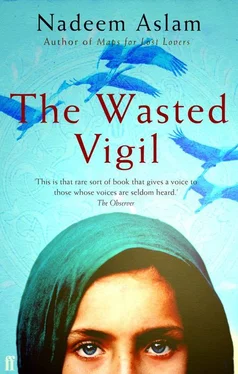Nadeem Aslam - The Wasted Vigil
Здесь есть возможность читать онлайн «Nadeem Aslam - The Wasted Vigil» весь текст электронной книги совершенно бесплатно (целиком полную версию без сокращений). В некоторых случаях можно слушать аудио, скачать через торрент в формате fb2 и присутствует краткое содержание. Год выпуска: 2009, Издательство: Faber and Faber, Жанр: Современная проза, на английском языке. Описание произведения, (предисловие) а так же отзывы посетителей доступны на портале библиотеки ЛибКат.
- Название:The Wasted Vigil
- Автор:
- Издательство:Faber and Faber
- Жанр:
- Год:2009
- ISBN:нет данных
- Рейтинг книги:4 / 5. Голосов: 1
-
Избранное:Добавить в избранное
- Отзывы:
-
Ваша оценка:
- 80
- 1
- 2
- 3
- 4
- 5
The Wasted Vigil: краткое содержание, описание и аннотация
Предлагаем к чтению аннотацию, описание, краткое содержание или предисловие (зависит от того, что написал сам автор книги «The Wasted Vigil»). Если вы не нашли необходимую информацию о книге — напишите в комментариях, мы постараемся отыскать её.
The Wasted Vigil — читать онлайн бесплатно полную книгу (весь текст) целиком
Ниже представлен текст книги, разбитый по страницам. Система сохранения места последней прочитанной страницы, позволяет с удобством читать онлайн бесплатно книгу «The Wasted Vigil», без необходимости каждый раз заново искать на чём Вы остановились. Поставьте закладку, и сможете в любой момент перейти на страницу, на которой закончили чтение.
Интервал:
Закладка:
Nadeem Aslam
The Wasted Vigil
for Sohail and Carole
What is more important to the history of the world — the Taliban or the collapse of the Soviet empire? A few agitated Muslims or the liberation of Central Europe and the end of the Cold War?
ZBIGNIEW BRZEZINSKI, President Jimmy Carter’s National Security Advisor, asked if he regretted ‘having supported Islamic fundamentalism, having given arms and advice to future terrorists’, Le Nouvel Observateur, 15–21 January 1998And the poet in his solitude
turned towards the warlord a corner of his mind
and gradually came to look upon him
and held a converse with him.
DAULAT SHAH OF HERAT, Tazkirat-ush-Shuara, 1487Book One
1. The Great Buddha
HER MIND is a haunted house.
The woman named Lara looks up at an imagined noise. Folding away the letter she has been rereading, she moves towards the window with its high view of the garden. Out there the dawn sky is filling up with light though a few of last night’s stars are still visible.
She turns after a while and crosses over to the circular mirror leaning against the far wall. Bringing it to the centre of the room she places it face up on the floor, gently, soundlessly, a kindness towards her host who is asleep in an adjoining room. In the mirror she ignores her own image, examining the reflection of the ceiling instead, lit by the pale early light.
The mirror is large — if it was water she could dive and disappear into it without touching the sides. On the wide ceiling are hundreds of books, each held in place by an iron nail hammered through it. A spike driven through the pages of history, a spike through the pages of love, a spike through the sacred. Kneeling on the dusty floor at the mirror’s edge she tries to read the titles. The words are reversed but that is easier than looking up for entire minutes would be.
There is no sound except her own slow breathing and, from outside, the breeze trailing its rippling robes through the overgrown garden.
She slides the mirror along the floor as though visiting another section of a library.
The books are all up there, the large ones as well as those that are no thicker than the walls of the human heart. Occasionally one of them falls by itself in an interior because its hold has weakened, or it may be brought down when desired with the judicious tapping of a bamboo pole.
A native of the faraway St Petersburg, what a long journey she has made to be here, this land that Alexander the Great had passed through on his unicorn, an area of fabled orchards and thick mulberry forests, of pomegranates that appear in the border decorations of Persian manuscripts written one thousand years ago.
Her host’s name is Marcus Caldwell, an Englishman who has spent most of his life here in Afghanistan, having married an Afghan woman. He is seventy years old and his white beard and deliberate movements recall a prophet, a prophet in wreckage. She hasn’t been here for many days so there is hesitancy in her still regarding Marcus’s missing left hand. The skin cup he could make with the palms of his hands is broken in half. She had asked late one evening, delicately, but he seemed unwilling to be drawn on the subject. In any case no explanations are needed in this country. It would be no surprise if the trees and vines of Afghanistan suspended their growth one day, fearful that if their roots were to lengthen they might come into contact with a landmine buried near by.
She lifts her hand to her face and inhales the scent of sandalwood deposited onto the fingers by the mirror’s frame. The wood of a living sandal tree has no fragrance, Marcus said the other day, the perfume materialising only after the cutting down.
Like the soul vacating the body after death, she thinks.
*
Marcus is aware of her presence regardless of where she is in the house. She fell ill almost immediately upon arrival four days ago, succumbing to the various exhaustions of her journey towards him, and he has cared for her since then, having been utterly alone before that for many months. From the descriptions she had been given of him, she said out of her fever the first afternoon, she had expected an ascetic dressed in bark and leaf and accompanied by a deer of the wilderness.
She said that a quarter of a century ago her brother had entered Afghanistan as a soldier with the Soviet Army, and that he was one of the ones who never returned home. She has visited Afghanistan twice before in the intervening decades but there has been proof neither of life nor of death, until perhaps now. She is here this time because she has learnt that Marcus’s daughter might have known the young Soviet man.
He told her his daughter, Zameen, was no longer alive.
‘Did she ever mention anything?’ she asked.
‘She was taken from this house in 1980, when she was seventeen years old. I never saw her again.’
‘Did anyone else?’
‘She died in 1986, I believe. She had become a mother by then — a little boy who disappeared around the time she died. She and an American man were in love, and I know all this from him.’
This was on the first day. She then drifted into a long sleep.
From the various plants in the garden he derived an ointment for the deeply bruised base of her neck, the skin there almost black above the right shoulder, as though some of the world’s darkness had attempted to enter her there. He wished pomegranates were in season as their liquid is a great antiseptic. When the bus broke down during the journey, she said, all passengers had disembarked and she had found herself falling asleep on a verge. There then came three blows to her body with a tyre iron in quick succession, the disbelief and pain making her cry out. She was lying down with her feet pointed towards the west, towards the adored city of Mecca a thousand miles away, a disrespect she was unaware of, and one of the passengers had taken it upon himself to correct and punish her.
Her real mistake was to have chosen to travel swaddled up like the women from this country, thinking it would be safer. Perhaps if her face had been somewhat exposed, the colour of her hair visible, she would have been forgiven as a foreigner. Everyone, on the other hand, had the right to make an example of an unwise Afghan woman, even a boy young enough to be her son.
Marcus opens a book. The early morning light is entering at a low angle from the window. The fibres of the page throw their elongated shadows across the words, so much so that they make the text difficult to read. He tilts the page to make it catch the light evenly, the texture of the paper disappearing.
Within the pages he finds a small pressed leaf, perfect but for a flake missing at the centre as though chewed off by a silkworm. The hole runs all the way through the pages also, where he had pulled out the iron nail to gain access to the words.
He has given her only the purest water when she has been thirsty. This country has always been a hub of things moving from one point of the compass to another, religion and myth, works of art, caravans of bundled Chinese silk flowing past camels loaded with glass from ancient Rome or pearls from the Gulf. The ogre whose activities created one of Afghanistan’s deserts was slain by Aristotle. And now Comanche helicopters bring sizeable crates of bottled water for America’s Special Forces teams that are operating in the region, the hunt for terrorists continuing out there. Caches of this water are unloaded at various agreed locations in the hills and deserts, but two winters ago a consignment must have broken its netting — it fell from the sky and came apart in an explosion close to Marcus’s house, a blast at whose core lay water not fire, the noise bringing him to the window to find the side of the house dripping wet and hundreds of the gleaming transparent bottles floating on the lake in front of the house. A moment later another roped bundle landed on the lake and sank out of sight. Perhaps it broke up and released the bottles, or did it catch on something down there and is still being held? Water buried inside water. He skimmed many of the bottles from the surface before they could disperse and found others over the coming days and weeks, split or whole, scattered in the long grasses of his neglected orchard.
Читать дальшеИнтервал:
Закладка:
Похожие книги на «The Wasted Vigil»
Представляем Вашему вниманию похожие книги на «The Wasted Vigil» списком для выбора. Мы отобрали схожую по названию и смыслу литературу в надежде предоставить читателям больше вариантов отыскать новые, интересные, ещё непрочитанные произведения.
Обсуждение, отзывы о книге «The Wasted Vigil» и просто собственные мнения читателей. Оставьте ваши комментарии, напишите, что Вы думаете о произведении, его смысле или главных героях. Укажите что конкретно понравилось, а что нет, и почему Вы так считаете.












